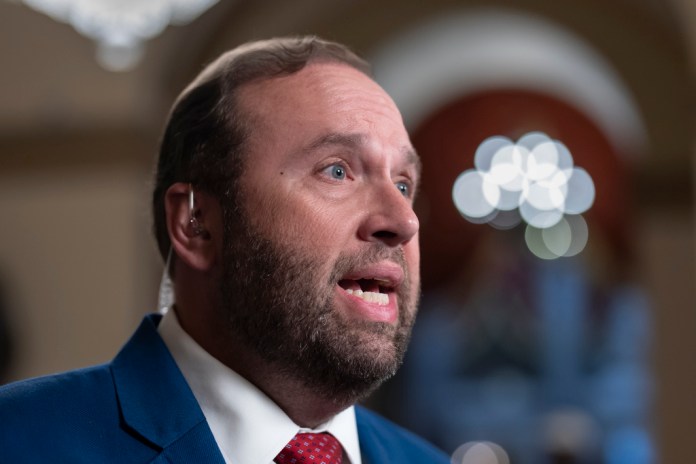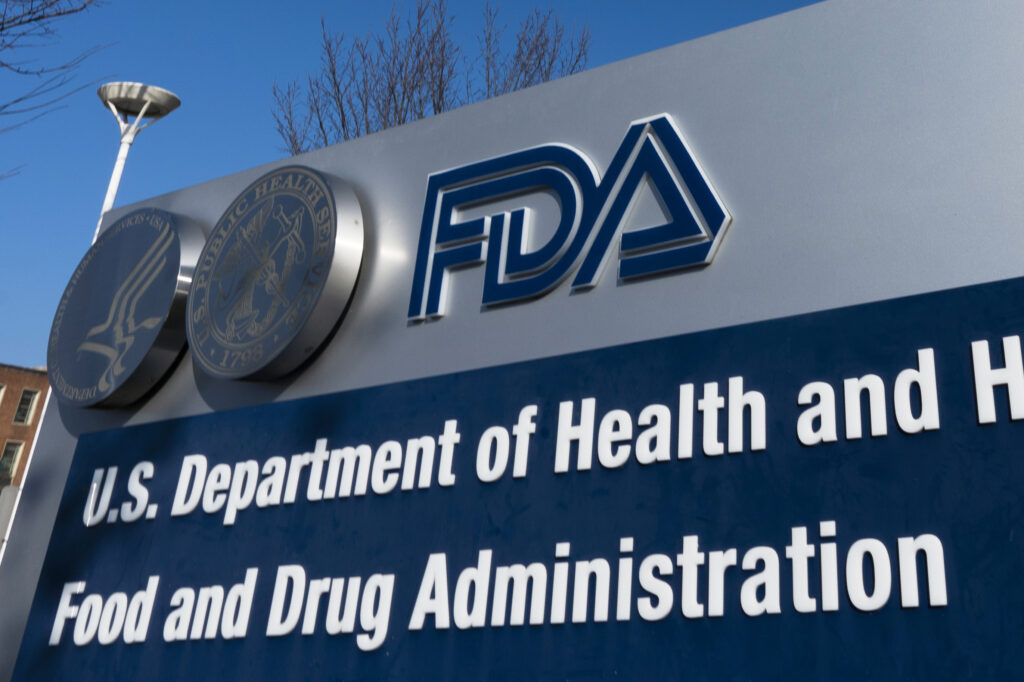Video footage captured in 2015 by an anti-abortion activist that was suppressed by then-California Attorney General Kamala Harris was released Thursday, revealing discussions among Planned Parenthood executives about the handling of body parts of fetuses aborted in the late second trimester, which activists have alleged amount to an admission of wrongdoing.
The video was recorded by David Daleiden of the Center for Medical Progress, who, with a colleague in 2015, went undercover to the National Abortion Federation’s commercial trade show.
Since July 2015, the videos have been suppressed following a court injunction that was lifted in May following their incorporation into the federal congressional record during a hearing on abortion hosted by Rep. Marjorie Taylor Greene (R-GA).
As Daleiden faces criminal charges for recording the videos surreptitiously, Harris’s role as attorney general of California at the onset of the case is likely to draw more attention as she campaigns for the presidency.
Content of the suppressed videos
In two different videos published on Thursday, Daleiden talks with the chief medical officer of Planned Parenthood Gulf Coast, Dr. Ann Schutt-Ainé, and the branch’s vice president of abortion access, Tram Nguyen. PPGC, based in Houston, closed following the federal Dobbs v. Jackson Women’s Health Organization decision in June 2022.
One of the videos shows both Schutt-Ainé and Nguyen describing how they take measures to avoid prosecution under the federal partial-birth abortion ban by dismembering the fetus while it is partially outside the womb to preserve the internal organs of the fetus for harvesting.
“If I’m doing a procedure, and I’m seeing that I’m in fear that it’s about to come to the umbilicus [navel], I might ask for a second set of forceps to hold the body at the cervix and pull off a leg, or two, so it’s not PBA,” Schutt-Ainé said in the video.
In a different video, Nguyen describes for Daleiden one scenario in which a minor patient’s discomfort required the physician “to hurry up” and compared it to “other days [when] it’s more intact, where it’s, like, maybe only, like, an arm that’s disarticulated.”
Later in the video, Nguyen describes how awkward discussing fetal tissue can be, remarking, “I’m like, ‘Yeah, I have like a leg for you.’ I’m like, oh s***, if other people were to hear me, they’d be like, you are f***ing evil.”
During the entire controversy, the Planned Parenthood Federation of America has maintained that it does not profit commercially from aborted fetal tissue from second- or third-trimester abortions but rather donates fetal tissue for scientific research.
During the height of the controversy in 2015, the National Abortion Federation issued a statement saying that it supports the use of aborted fetal tissue for scientific research that “has the potential to help millions of Americans suffering from diabetes, Parkinson’s, Alzheimer’s, muscular dystrophy, leukemia, and other serious medical conditions.”
“Medical progress should not be impeded by those whose agenda is to demonize abortion providers and make abortion care inaccessible for women,” the 2015 NAF statement reads. “We cannot allow underhanded, misleading tactics by anti-abortion extremists to stigmatize life-saving medical research.”
Harris’s role in the Daleiden investigation
Harris was attorney general of California at the time and was directly involved in the prosecution of Daleiden. This includes the controversial decision to raid Daleiden’s home, during which officers took his personal laptop and multiple hard drives.
Letters obtained from court documents from Harris’s time as attorney general reveal that she had met with Planned Parenthood executives prior to the raid on Daleiden’s home that resulted in the seizure of the videos.
At the time, Harris was running for California’s open Senate seat and had been endorsed by Planned Parenthood.
Harris drew fire following the raid from anti-abortion groups, who said that it was a significant conflict of interest.
Nearly 10 years later, anti-abortion advocates are reviving interest in the case, arguing that Harris abused the California Department of Justice for political motives while in office.
Most recent updates in the case
The legal battle regarding these videos has continued for the past nine years with no end in sight.
In March, Daleiden used portions of the enjoined video during a congressional hearing hosted by Greene titled “Investigating Baby Organ Harvesting Black Market.” Following the hearing, Daleiden posted unredacted videos on his social media accounts, arguing that doing so did not violate the injunction because it was footage that had been incorporated into the federal congressional record.
Daleiden still could face prison time in California and is fighting eight felony charges for making the videos without permission to record, as well as using a fake driver’s license to enter the PPGC offices in Houston under false pretenses.
CLICK HERE TO READ MORE FROM THE WASHINGTON EXAMINER
A tentative trial date has been set for December in the San Francisco Superior Court.
The Center for Medical Progress did not respond to the Washington Examiner’s request for comment on the status of the case.
2024-08-08 21:22:00, http://s.wordpress.com/mshots/v1/https%3A%2F%2Fwww.washingtonexaminer.com%2Fpolicy%2Fhealthcare%2F3115477%2Fplanned-parenthood-sting-video-suppressed-by-harris-released%2F?w=600&h=450, Video footage captured in 2015 by an anti-abortion activist that was suppressed by then-California Attorney General Kamala Harris was released Thursday, revealing discussions among Planned Parenthood executives about the handling of body parts of fetuses aborted in the late second trimester, which activists have alleged amount to an admission of wrongdoing. The video was recorded,
Video footage captured in 2015 by an anti-abortion activist that was suppressed by then-California Attorney General Kamala Harris was released Thursday, revealing discussions among Planned Parenthood executives about the handling of body parts of fetuses aborted in the late second trimester, which activists have alleged amount to an admission of wrongdoing.
The video was recorded by David Daleiden of the Center for Medical Progress, who, with a colleague in 2015, went undercover to the National Abortion Federation’s commercial trade show.
Since July 2015, the videos have been suppressed following a court injunction that was lifted in May following their incorporation into the federal congressional record during a hearing on abortion hosted by Rep. Marjorie Taylor Greene (R-GA).
As Daleiden faces criminal charges for recording the videos surreptitiously, Harris’s role as attorney general of California at the onset of the case is likely to draw more attention as she campaigns for the presidency.
Content of the suppressed videos
In two different videos published on Thursday, Daleiden talks with the chief medical officer of Planned Parenthood Gulf Coast, Dr. Ann Schutt-Ainé, and the branch’s vice president of abortion access, Tram Nguyen. PPGC, based in Houston, closed following the federal Dobbs v. Jackson Women’s Health Organization decision in June 2022.
One of the videos shows both Schutt-Ainé and Nguyen describing how they take measures to avoid prosecution under the federal partial-birth abortion ban by dismembering the fetus while it is partially outside the womb to preserve the internal organs of the fetus for harvesting.
“If I’m doing a procedure, and I’m seeing that I’m in fear that it’s about to come to the umbilicus [navel], I might ask for a second set of forceps to hold the body at the cervix and pull off a leg, or two, so it’s not PBA,” Schutt-Ainé said in the video.
In a different video, Nguyen describes for Daleiden one scenario in which a minor patient’s discomfort required the physician “to hurry up” and compared it to “other days [when] it’s more intact, where it’s, like, maybe only, like, an arm that’s disarticulated.”
Later in the video, Nguyen describes how awkward discussing fetal tissue can be, remarking, “I’m like, ‘Yeah, I have like a leg for you.’ I’m like, oh s***, if other people were to hear me, they’d be like, you are f***ing evil.”
During the entire controversy, the Planned Parenthood Federation of America has maintained that it does not profit commercially from aborted fetal tissue from second- or third-trimester abortions but rather donates fetal tissue for scientific research.
During the height of the controversy in 2015, the National Abortion Federation issued a statement saying that it supports the use of aborted fetal tissue for scientific research that “has the potential to help millions of Americans suffering from diabetes, Parkinson’s, Alzheimer’s, muscular dystrophy, leukemia, and other serious medical conditions.”
“Medical progress should not be impeded by those whose agenda is to demonize abortion providers and make abortion care inaccessible for women,” the 2015 NAF statement reads. “We cannot allow underhanded, misleading tactics by anti-abortion extremists to stigmatize life-saving medical research.”
Harris’s role in the Daleiden investigation
Harris was attorney general of California at the time and was directly involved in the prosecution of Daleiden. This includes the controversial decision to raid Daleiden’s home, during which officers took his personal laptop and multiple hard drives.
Letters obtained from court documents from Harris’s time as attorney general reveal that she had met with Planned Parenthood executives prior to the raid on Daleiden’s home that resulted in the seizure of the videos.
At the time, Harris was running for California’s open Senate seat and had been endorsed by Planned Parenthood.
Harris drew fire following the raid from anti-abortion groups, who said that it was a significant conflict of interest.
Nearly 10 years later, anti-abortion advocates are reviving interest in the case, arguing that Harris abused the California Department of Justice for political motives while in office.
Most recent updates in the case
The legal battle regarding these videos has continued for the past nine years with no end in sight.
In March, Daleiden used portions of the enjoined video during a congressional hearing hosted by Greene titled “Investigating Baby Organ Harvesting Black Market.” Following the hearing, Daleiden posted unredacted videos on his social media accounts, arguing that doing so did not violate the injunction because it was footage that had been incorporated into the federal congressional record.
Daleiden still could face prison time in California and is fighting eight felony charges for making the videos without permission to record, as well as using a fake driver’s license to enter the PPGC offices in Houston under false pretenses.
CLICK HERE TO READ MORE FROM THE WASHINGTON EXAMINER
A tentative trial date has been set for December in the San Francisco Superior Court.
The Center for Medical Progress did not respond to the Washington Examiner’s request for comment on the status of the case.
, Video footage captured in 2015 by an anti-abortion activist that was suppressed by then-California Attorney General Kamala Harris was released Thursday, revealing discussions among Planned Parenthood executives about the handling of body parts of fetuses aborted in the late second trimester, which activists have alleged amount to an admission of wrongdoing. The video was recorded by David Daleiden of the Center for Medical Progress, who, with a colleague in 2015, went undercover to the National Abortion Federation’s commercial trade show. Since July 2015, the videos have been suppressed following a court injunction that was lifted in May following their incorporation into the federal congressional record during a hearing on abortion hosted by Rep. Marjorie Taylor Greene (R-GA). As Daleiden faces criminal charges for recording the videos surreptitiously, Harris’s role as attorney general of California at the onset of the case is likely to draw more attention as she campaigns for the presidency. Content of the suppressed videos In two different videos published on Thursday, Daleiden talks with the chief medical officer of Planned Parenthood Gulf Coast, Dr. Ann Schutt-Ainé, and the branch’s vice president of abortion access, Tram Nguyen. PPGC, based in Houston, closed following the federal Dobbs v. Jackson Women’s Health Organization decision in June 2022. One of the videos shows both Schutt-Ainé and Nguyen describing how they take measures to avoid prosecution under the federal partial-birth abortion ban by dismembering the fetus while it is partially outside the womb to preserve the internal organs of the fetus for harvesting. “If I’m doing a procedure, and I’m seeing that I’m in fear that it’s about to come to the umbilicus [navel], I might ask for a second set of forceps to hold the body at the cervix and pull off a leg, or two, so it’s not PBA,” Schutt-Ainé said in the video. In a different video, Nguyen describes for Daleiden one scenario in which a minor patient’s discomfort required the physician “to hurry up” and compared it to “other days [when] it’s more intact, where it’s, like, maybe only, like, an arm that’s disarticulated.” Later in the video, Nguyen describes how awkward discussing fetal tissue can be, remarking, “I’m like, ‘Yeah, I have like a leg for you.’ I’m like, oh s***, if other people were to hear me, they’d be like, you are f***ing evil.” During the entire controversy, the Planned Parenthood Federation of America has maintained that it does not profit commercially from aborted fetal tissue from second- or third-trimester abortions but rather donates fetal tissue for scientific research. During the height of the controversy in 2015, the National Abortion Federation issued a statement saying that it supports the use of aborted fetal tissue for scientific research that “has the potential to help millions of Americans suffering from diabetes, Parkinson’s, Alzheimer’s, muscular dystrophy, leukemia, and other serious medical conditions.” “Medical progress should not be impeded by those whose agenda is to demonize abortion providers and make abortion care inaccessible for women,” the 2015 NAF statement reads. “We cannot allow underhanded, misleading tactics by anti-abortion extremists to stigmatize life-saving medical research.” Harris’s role in the Daleiden investigation Harris was attorney general of California at the time and was directly involved in the prosecution of Daleiden. This includes the controversial decision to raid Daleiden’s home, during which officers took his personal laptop and multiple hard drives. Letters obtained from court documents from Harris’s time as attorney general reveal that she had met with Planned Parenthood executives prior to the raid on Daleiden’s home that resulted in the seizure of the videos. At the time, Harris was running for California’s open Senate seat and had been endorsed by Planned Parenthood. Harris drew fire following the raid from anti-abortion groups, who said that it was a significant conflict of interest. Nearly 10 years later, anti-abortion advocates are reviving interest in the case, arguing that Harris abused the California Department of Justice for political motives while in office. Most recent updates in the case The legal battle regarding these videos has continued for the past nine years with no end in sight. In March, Daleiden used portions of the enjoined video during a congressional hearing hosted by Greene titled “Investigating Baby Organ Harvesting Black Market.” Following the hearing, Daleiden posted unredacted videos on his social media accounts, arguing that doing so did not violate the injunction because it was footage that had been incorporated into the federal congressional record. Daleiden still could face prison time in California and is fighting eight felony charges for making the videos without permission to record, as well as using a fake driver’s license to enter the PPGC offices in Houston under false pretenses. CLICK HERE TO READ MORE FROM THE WASHINGTON EXAMINER A tentative trial date has been set for December in the San Francisco Superior Court. The Center for Medical Progress did not respond to the Washington Examiner’s request for comment on the status of the case., ,  , https://www.washingtonexaminer.com/wp-content/uploads/2024/08/kamala_harris_white_suit-2.webp, Washington Examiner, Political News and Conservative Analysis About Congress, the President, and the Federal Government, https://www.washingtonexaminer.com/wp-content/uploads/2023/11/cropped-favicon-32×32.png, https://www.washingtonexaminer.com/feed/, Gabrielle M. Etzel,
, https://www.washingtonexaminer.com/wp-content/uploads/2024/08/kamala_harris_white_suit-2.webp, Washington Examiner, Political News and Conservative Analysis About Congress, the President, and the Federal Government, https://www.washingtonexaminer.com/wp-content/uploads/2023/11/cropped-favicon-32×32.png, https://www.washingtonexaminer.com/feed/, Gabrielle M. Etzel,









